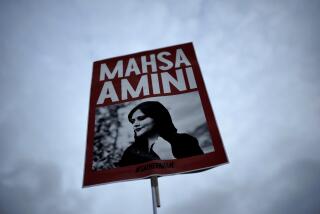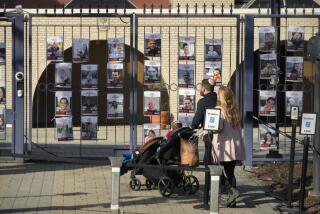Alleged Al Qaeda chief dead, officials say
Abu Ubaida al Masri, a suspected mastermind of Al Qaeda plots including the London transportation bombings of 2005, has died of an infectious disease in Pakistan, Western anti-terrorism officials said Wednesday.
The Egyptian militant is thought to have died of hepatitis C, a U.S. anti-terrorism official said. Masri was the powerful, if little-known, chief of the terrorist network’s external operations who allegedly trained recruits in hide-outs in Pakistan and dispatched them to carry out attacks against the West, according to Western investigators.
As The Times reported last week, anti-terrorism officials in at least three countries had come to believe that Masri had died in recent months, but investigators did not have confirmation and noted that Al Qaeda had not paid tribute to Masri with eulogies on the Internet as it has with other fallen leaders.
Recently, however, anti-terrorism investigators detected conversations among Al Qaeda militants revealing that Masri had died of hepatitis C, the U.S. official said. Death by illness would explain the lack of eulogies, which are generally reserved for extremists who die violently as “martyrs,” officials said.
“The bad guys have been talking about it among themselves,” said the U.S. anti-terrorism official, who asked to remain anonymous because of the sensitive information. “I would say it happened during the last three months. If it had been an airstrike they would have said it. But Abu Ubaida al Masri wasn’t well known enough or high-ranking enough to warrant automatic obituaries unless he died [as a ‘martyr’].”
It is likely that Masri has already been replaced, experts say. Potential successors include Khalid Habib, an Egyptian who, according to expert Rohan Gunaratna, author of “Inside Al Qaeda,” has overseen Al Qaeda “internal” operations in Pakistan and Afghanistan. Others who worked with Masri and may have replaced him include Hamza al Jawfi, a Gulf Arab, and Midhat Mursi, an Egyptian chemist who has allegedly overseen Al Qaeda’s efforts to develop unconventional weapons. Mursi was present while recruits from Northern Europe were trained in Pakistan last spring, according to investigators.
Anti-terrorism officials consider operations chiefs more urgent prey than even Osama bin Laden because they are front-line figures in attacks on the West. Masri was the target of several airstrikes over the years and was even reported dead after a missile blew up an Al Qaeda safe house in January 2006.
Although confirmation remains difficult, the latest intelligence seems conclusive, officials said.
“We consider him dead,” a Western intelligence official said. “I have not seen a body, of course.”
Masri’s real name was unknown. He was an explosives expert in his mid-40s and a veteran of combat in Afghanistan, Bosnia-Herzegovina and Chechnya, according to court files. Captured militants described him as a stocky, graying Egyptian who had lost two fingers in combat or handling explosives. He served as a trainer at a Bin Laden camp and, after the Sept. 11 attacks, led paramilitary forces in the Kunar province of Afghanistan.
About four years ago, Masri became external operations boss after predecessors were killed or captured, officials say. He allegedly took part in planning and training for the attacks that killed 52 people on the London transportation system in July 2005 and a failed follow-up bombing two weeks later, according to U.S. and European officials.
Investigators say he also played a lead role in the most ambitious plot since the Sept. 11 attacks: a foiled attempt in August 2006 to blow up planes from Britain to North America using smuggled liquid explosives and bomb components. Eight suspects are now on trial in London in that case.
Last spring, Masri allegedly trained recruits from Denmark and Germany at a compound near Mir Ali in North Waziristan, officials say.
Masri lived in Munich, Germany, from 1995 to 1999 and also in Britain, according to American officials and the court file. His knowledge of Europe, its languages and potential targets led European anti-terrorism officials to consider him especially dangerous.
Hepatitis C is generally contracted through use of unsanitary needles, contact with blood or sexual activity. But the disease disproportionately affects Egyptians because of a mass accidental contamination through a vaccination program gone awry in Egypt between the 1950s and 1980s. It is possible, therefore, that Masri had suffered from the disease for some time.
In any case, the circumstances of his death reflect the harsh conditions in which Al Qaeda leaders live while on the run in the Pakistani-Afghan border region.
“It’s pretty unhealthy over there,” the U.S. official said.
More to Read
Start your day right
Sign up for Essential California for news, features and recommendations from the L.A. Times and beyond in your inbox six days a week.
You may occasionally receive promotional content from the Los Angeles Times.






